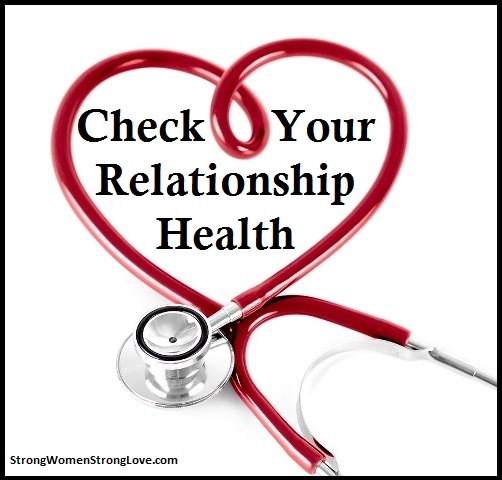by Strong Women Strong Love | May 14, 2017 | Passionate Partnership |

There are two times in a marriage when couples are most likely to split. The first comes around the seven-year mark. The second comes at around 12 years. Whether or not you’re near one of those milestones, it’s always good to monitor your relationship health. Here are a few tips to guide you through a marriage checkup.
Managing Conflicts
In the seven-year danger zone, splits happen because of conflicts. Not surprisingly, this time frame is when many couples are starting a family and dealing with all of the associated stresses. The warning sign in this time period isn’t how often you fight. It’s whether you fight the right way.
Specifically, look at whether your conflicts are characterized by Dr. John Gottman‘s “Four Horsemen.” Gottman gave these behaviors such a dramatic name because their constant presence in a marriage strongly predicts which couples will divorce.
The Horsemen are:
- Defensiveness
- Criticism
- Stonewalling
- Contempt
If you don’t like the behaviors you’re bringing to conflicts with your husband, you might need to cut yourself a break and focus on self-care. When we’re stressed (as most of us seem to be constantly), we get more controlling, rigid and judgmental in our relationships with others.
Staying Close
At 12 years, couples tend to split because they’re becoming alienated from each other. Again, our stressed and busy lives play a role. It can be tricky to nurture your relationship amid everything else you’re juggling, but it’s vital.
To keep your bond strong, consider questions like these.
- Is the amount of physical intimacy in your relationship satisfying for both of you? Your physical relationship strengthens your emotional relationship.
- Do you treat each other with the same consideration that you’d treat good friends?
- Do you take advantage of opportunities to show love and appreciation — such as greeting each other warmly after your work days?
- Do you practice deep listening (making eye contact, summarizing what the other said, etc.) with each other?
- Are you curious about each other? In other words, do you ask yourself questions like “He seems tense. I wonder what’s going on with him?” instead of leaping to conclusions?
Whether you’ve been married one year or 50 years, look through this blog for more tips and insights to improve the health of your marriage. Although your relationship may feel fine right now, doing a regular checkup can be an important part of keeping things on track.
by Strong Women Strong Love | Feb 28, 2017 | Parenthood, Poisonous Patterns |

It’s a crossroads that countless couples have encountered: Their marriage has become unhappy and unsatisfying. But they fear hurting their children by divorcing.
Should you stay in your marriage for the kids, or end it? Both choices are painful. Which one is better?
Each couple has to ultimately decide what’s right for them and their family. But I do believe there’s a wise way couples can approach this life-altering decision.
A caveat before I go on: This advice is for people in unhappy marriages, not relationships that are marked by abuse and aggression. If you’re in a situation like this, please seek professional help.
Have You Given Your Marriage a Real Chance?
For most unhappy couples, the decision about ending a marriage when kids are involved isn’t so clear-cut. You may long for an escape from your marriage, but you also know the stakes are high for both you and your children. A divorce can complicate all your lives for years. And no matter what you decide, you and your husband will still have to co-parent.
Because divorce is a serious decision, it’s not one that you should rush into. Especially since some studies have shown that a good percentage of people who divorce end up regretting their decision.
That’s why my advice to most couples on the brink is to make sure that they’ve done everything they can to save their marriage before calling it quits.
Using the Research on Marriage to Help You
If you’re intent on working on your marriage, there’s very good news. Research has given us clear insight about what makes marriages succeed or fail. If you are determined to give your relationship a chance, you can be smart and focused in your approach. If you’re both willing to put in the work — reading books, getting therapy, going to marriage workshops — you have a better chance than ever of salvaging your relationship.
Have you educated yourself about what makes a marriage work? Do you know about the four horsemen and the best predictor of divorce? If you don’t know what I’m talking about, then you have some work to do.
As a parent, if you do divorce, you want to be able to honestly tell your kids that you did everything you could to try to make the marriage work.
Sadly, not every marriage can be rescued. If that’s the case for you and your husband, you’ll at least have the peace of knowing you were thoughtful in making the decision to divorce, and that it is really the better option for you. You’ll move forward with fewer “what ifs” and regrets. And the efforts you put in should help the two of you with your post-divorce relationship as co-parents to your kids.
If you are looking for ways to work on your marriage, I want to point you toward my book Strong Women, Strong Love. I wrote it to help busy couples nurture their marriage amid their stressed and demanding lives. If you’re ready to seek couples therapy, seek recommendations from people you trust, consult your insurer’s director of providers or browse Psychology Today‘s listing of therapists in your area.
by Strong Women Strong Love | Apr 17, 2016 | Poisonous Patterns |

We all know couples who seem to bicker and spar all the time. Maybe you’re even part of a couple like that yourself.
Does constant conflict mean that a marriage is in trouble? My answer here might surprise you.
Through my work with many, many couples, I’ve seen that the frequency of your arguments with your spouse is much less important than the way you fight.
In fact, Dr. John Gottman, one of the leading researchers on marital happiness, says that how you manage conflict in your relationship is the most important factor in determining whether you stay married.
Gottman isn’t saying that your goal should be a conflict-free marriage. And neither am I. All couples disagree from time to time, and there’s nothing wrong with that. When you sweep issues under the rug in hopes of avoiding an argument, that just breeds resentment and hurts your relationship in the long run. Venting complaints in a constructive way clears the air and strengthens your bond.
So how do you do that?
Avoid the ‘Four Horsemen’
First, you have to steer clear of a few behaviors that can make conflicts devastating to your marriage. Gottman refers to these as the “Four Horsemen” because their constant presence in a relationship accurately identifies couples most likely to end up divorced. We all slip into these behaviors sometimes, but beware of letting them become a pattern when you argue with your spouse.
- Defensiveness. Conflict becomes toxic when partners deny responsibility, make excuses or counterattack.
- Criticism. Don’t attack your spouse’s personality or character; instead, stay focused on the specific problem.
- Stonewalling. Some people shut down in a conflict because they are trying not to “make things worse.” Ironically, stonewalling often has the opposite effect.
- Contempt. Showing contempt is the absolute worst thing you can do during an argument with your spouse. Insulting your husband in front of others, rolling your eyes and mocking can all quickly damage your relationship.
Follow the Rules for Fighting Fair
Now that you know the “danger zones” to avoid during your next argument, here are a few tips to strengthen your bond, even when you’re in conflict:
- Time it right. Don’t bring up issues when you are tired, irritated or feel like you can’t control yourself — or when you can tell that your husband is experiencing one of those states.
- Get close. Pause, hold hands and make eye contact when you’re disagreeing. When you are in touch with the humanity of your partner, you’ll be less likely to hurt each other.
- Choose your words wisely. The first few moments of your interaction set the tone for what comes next. You know your husband better than anyone else does — which means you probably know exactly what to say to wound him deeply. No matter how angry you are, exercise restraint and remember that your words have power. A few mean-spirited words in the heat of the moment can haunt your relationship for a long time.
- Pause. Ask for time to calm down if you need it, but keep in mind that you do still need to come back and address the issue.
If you’re too upset during your next argument to recall anything else from this article, just remember that the key word is “respect.” When you maintain respect with each other during a conflict, you keep your relationship on solid ground. If you’d like more advice on fighting fair in your relationship, you will find an entire chapter devoted to the topic in my book Strong Women, Strong Love.
by Strong Women Strong Love | May 30, 2013 | Poisonous Patterns, Videos |
It is vital to know what behaviors to stop if you want to keep your marriage strong. Here’s a great article by Dr. Renay Bradley in the Huffington Post that summarizes the behaviors research reveals are most likely to result in a couple getting divorced:
The Top Five Signs You May be Headed for Divorce
If you’ve ever been married or in a committed relationship, you likely know that marriage is not always bliss. Unfortunately, many of us have grown up thinking that, someday, we’ll marry our “Prince Charming” or “Cinderella” and live happily ever after. That’s the way it’s supposed to be, isn’t it? As a Family Psychologist and Director of Research and Programming at the Relationship Research Institute (a non-profit founded by Dr. John Gottman, dedicated to strengthening relationships through research)–also known as the “Love Lab”–I’ve seen my fair share of people who share this fantasy. Unfortunately, this fairytale ideal may have sadly given many of us somewhat unrealistic expectations when it comes to relationships. Luckily, Dr. John Gottman and his team at the Love Lab have spent the last 35+ years studying couples; this work has given us a more realistic understanding of what happy versus dysfunctional relationships look like.
Continue reading at http://www.huffingtonpost.com/renay-p-cleary-bradley/the-top-five-signs-that-y_b_833824.html




